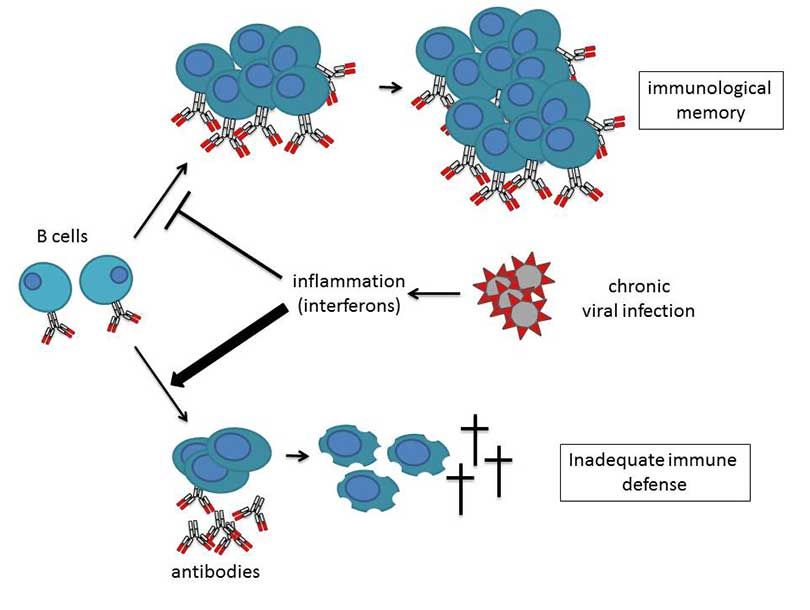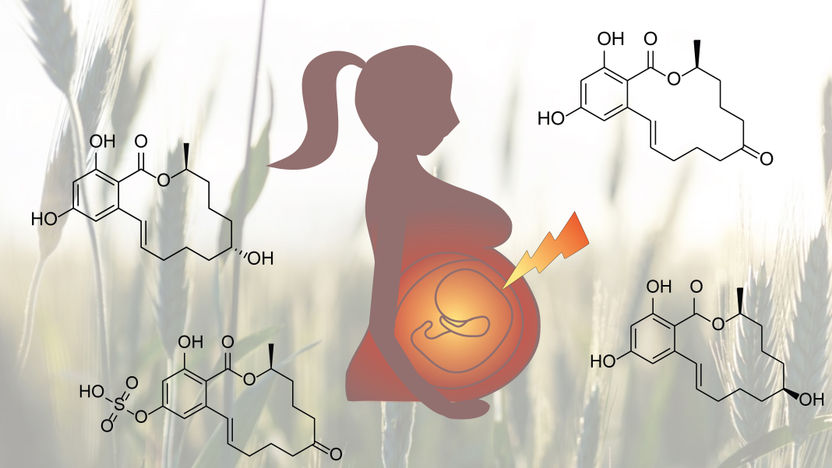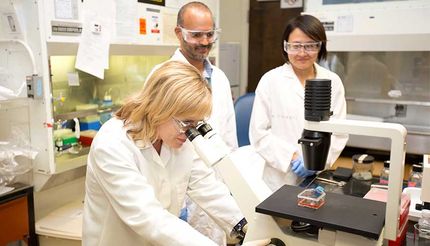Inflammation Triggers Unsustainable Immune Response to Chronic Viral Infection
Scientists at the University of Basel discovered a fundamental new mechanism explaining the inadequate immune defense against chronic viral infection. These results may open up new avenues for vaccine development.

Under the influence of interferons, chronic viral infections cause strong inflammation. This causes the B cells to initiate an inadequate immune response which first optimizes the production of antibodies for a short period, but then rapidly subsides.
University of Basel
In the course of an infection or upon vaccination, specialized cells of our immune system, so-called B cells, produce antibodies that bind viruses and inactivate them. In the context of chronic viral infections such as HIV or hepatitis C virus, however, antibody production by B cells is quantitatively inadequate and starts too late.
A team of scientists headed by Prof. Daniel Pinschewer at the Department of Biomedicine, University of Basel, reports that the inadequate antibody response to chronic viral diseases is due to the strong inflammatory reaction upon infection. While most pronounced at the onset of an infection, inflammation can persist for decades, especially in HIV/AIDS.
Hasty immune response lasts only short-term
Under the influence of inflammatory messengers, so called interferons, B cells produce as many antibodies as they possibly can. Unfortunately, this hasty response occurs at the expense of sustainability. B cells that turn on antibody production too quickly lose their potential to proliferate and die shortly thereafter. As a consequence, the immune response takes an impetuous start but subsides rapidly.
The scientists assume that this panic reaction of B cells reflects a mechanism ensuring an optimized response to acute life threatening infections. In the context of chronic infections, however, the battle is not decided within a matter of days, but rather only after months or years. Under these circumstances, the hasty reaction of our body seems inappropriate and may actually favor the virus.
Cornerstone for new vaccines
For viral diseases such as HIV or hepatitis C protective vaccines remain unavailable. The scientists are hopeful that the discovery of this fundamental mechanism may provide a basis to improve vaccination strategies against chronic viral diseases.
Original publication
Fallet et al.; "Interferon-driven deletion of antiviral B cells at the onset of chronic infection"; Science Immunology; 2016
Most read news
Original publication
Fallet et al.; "Interferon-driven deletion of antiviral B cells at the onset of chronic infection"; Science Immunology; 2016
Topics
Organizations
Other news from the department science

Get the life science industry in your inbox
By submitting this form you agree that LUMITOS AG will send you the newsletter(s) selected above by email. Your data will not be passed on to third parties. Your data will be stored and processed in accordance with our data protection regulations. LUMITOS may contact you by email for the purpose of advertising or market and opinion surveys. You can revoke your consent at any time without giving reasons to LUMITOS AG, Ernst-Augustin-Str. 2, 12489 Berlin, Germany or by e-mail at revoke@lumitos.com with effect for the future. In addition, each email contains a link to unsubscribe from the corresponding newsletter.
Most read news
More news from our other portals
Last viewed contents
List_of_medical_abbreviations

New biotech venture PHIOGEN to tackle the global threat of antimicrobial resistance - By optimizing nature’s defenders, the team has produced unprecedented phage treatments
Epigenomics AG Successfully Validates Lung Cancer Test in Clinical Trial






















































